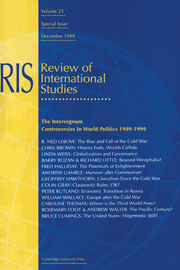Book contents
- Frontmatter
- Contents
- Acknowledgements
- Foreword
- Notes on contributors
- Introduction
- 1 The Rise and Fall of the Cold War in Comparative Perspective
- 2 History Ends, World Collide
- 3 Globalization and National Governance: Antinomies or Interdependence?
- 4 Beyond Westphalia?: Capitalism after the ‘Fall’
- 5 The Potentials of Enlightenment
- 6 Marxism after Communism
- 7 Liberalism Since the Cold War: An Enemy to Itself?
- 8 Clausewitz Rules, OK? The Future is the Past—with GPS
- 9 Mission Impossible? The IMF and the Failure of the Market Transition in Russia
- 10 Europe after the Cold War: Interstate Order or post-Sovereign Regional System?
- 11 Where is the Third World Now?
- 12 Whatever Happened to the Pacific Century?
- 13 Still the American Century
- Index
4 - Beyond Westphalia?: Capitalism after the ‘Fall’
Published online by Cambridge University Press: 05 November 2009
- Frontmatter
- Contents
- Acknowledgements
- Foreword
- Notes on contributors
- Introduction
- 1 The Rise and Fall of the Cold War in Comparative Perspective
- 2 History Ends, World Collide
- 3 Globalization and National Governance: Antinomies or Interdependence?
- 4 Beyond Westphalia?: Capitalism after the ‘Fall’
- 5 The Potentials of Enlightenment
- 6 Marxism after Communism
- 7 Liberalism Since the Cold War: An Enemy to Itself?
- 8 Clausewitz Rules, OK? The Future is the Past—with GPS
- 9 Mission Impossible? The IMF and the Failure of the Market Transition in Russia
- 10 Europe after the Cold War: Interstate Order or post-Sovereign Regional System?
- 11 Where is the Third World Now?
- 12 Whatever Happened to the Pacific Century?
- 13 Still the American Century
- Index
Summary
Capitalism and the meaning of Westphalia
When the Berlin Wall was breached in 1989 and the Cold War ended, specialists in the field of international relations (IR) readily acknowledged that it was necessary to take stock and assess the historical significance of these events. Unsurprisingly, no agreement has been reached. For most realists, the events reflect no more than an important shift in the power structure of the international system. But for liberals, the forty years of Cold War are now depicted not as a struggle for power, but as an ideological battle between capitalism and communism from which capitalism has emerged triumphant. The significance of this development for the future of international relations is difficult to gauge. As a key concept, ‘capitalism’ has largely been the preserve of the Marxian fringe in IR. It did not resonate amongst most mainstream theorists in the field, whether realist or liberal. The concept was most familiar as a term of communist propaganda. It was avoided by many specialists during the Cold War era who failed to see how capitalism could promote an understanding of superpower relations. But with the end of the Cold War now linked to the triumph of capitalism, it is impossible for liberals, in particular, to discuss the future of the international system without some evaluation of the unfolding international role being played by capitalism.
At the centre of this ongoing debate about the future of international relations lie competing evaluations of what has come to be known as the Westphalian system. Westphalia has been accorded iconic status in IR.
- Type
- Chapter
- Information
- The Interregnum: Controversies in World Politics 1989–1999 , pp. 89 - 104Publisher: Cambridge University PressPrint publication year: 2000
- 1
- Cited by



